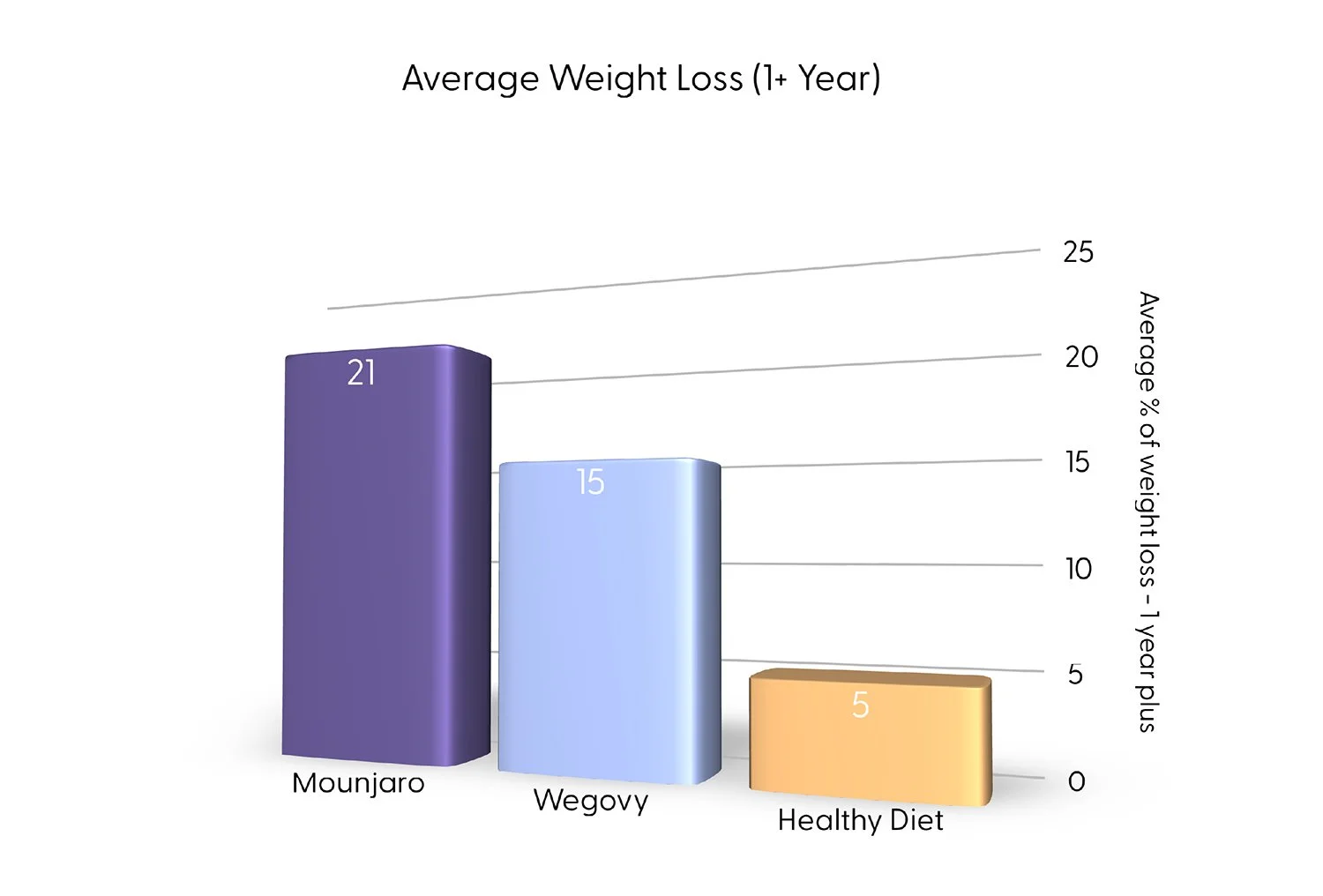Which wins for long-term weight loss?
Mounjaro vs. Wegovy vs. Healthy diet… Efficacy & Metabolic Health
Losing weight and keeping it off is a major challenge. Two new medications – Mounjaro (generic name tirzepatide) and Wegovy (generic semaglutide) – have generated huge buzz for their dramatic weight loss results. But how do these prescription injections compare to the tried-and-true approach of a healthy balanced diet and lifestyle changes?
Below we break down the evidence from clinical trials and real-world studies across key factors: weight loss efficacy, metabolic health, side effects, cost, and long-term sustainability…
Weight Loss Efficacy
Mounjaro (Tirzepatide): Originally developed for type 2 diabetes, Mounjaro has shown unprecedented weight loss in clinical trials. In a 72-week obesity trial (SURMOUNT-1), patients on the highest dose of tirzepatide lost about 21% of their body weight on average 1. To put that in perspective, someone weighing 250 lb could lose ~52 lb. Even lower doses produced 15–20% weight reduction, far above the placebo group (~3%) 1. In fact, over half of patients on tirzepatide 10–15 mg lost at least 20% of their weight 2. These results are nearly double what older weight-loss drugs achieved. Real-world data likewise show greater weight loss with tirzepatide than semaglutide; one large study found patients on tirzepatide had lost about 7% more body weight at 1 year than those on semaglutide 3 4.
Wegovy (Semaglutide): Semaglutide, a weekly GLP-1 agonist, was approved specifically for obesity as Wegovy in 2021. In its pivotal 68-week trial, patients on Wegovy lost about 15% of their body weight on average vs ~2% with placebo (lifestyle changes alone) 5. Nearly 70% of Wegovy patients lost ≥10% and about half lost ≥15% 6 – roughly 37 lb for a 250 lb person. While slightly less potent than tirzepatide, this level of weight loss is still far higher than typical diet programs. For context, many year-long diet-and-exercise programs result in around 5–10% weight loss if adhered to diligently 7. In the semaglutide trial, the placebo group (who received diet/exercise counseling) only lost ~2–3% 5, underscoring how much more weight the medication helped take off.
Healthy Diet & Lifestyle: A balanced, calorie-controlled diet (with exercise) can certainly reduce weight, but the average results are modest compared to these medications. Clinical studies of diet changes alone often find ~5–10% body weight reduction over 6–12 months in those who stick with it 7. For example, a meta-analysis noted many participants lose about 7% at 6 months, but some regain occurs by 1 year 8. The degree of weight loss varies widely – some individuals succeed in losing 10%+ with intensive lifestyle changes, while others struggle to lose much at all. Overall, lifestyle remains an essential foundation (both drug trials provided diet/exercise counseling to all participants), but on average diet alone tends to produce significantly less weight loss than Mounjaro or Wegovy in the same timeframe 5.
Average weight loss and blood sugar (A1C) improvements with Mounjaro, Wegovy, and a healthy diet. Clinical trials show prescription medications lead to much greater weight loss than diet changes alone 1 5. Tirzepatide (Mounjaro) also drives the largest reductions in A1C (a marker of blood sugar), especially in people with diabetes 9. Healthy eating can modestly improve blood sugar, but not as powerfully as the medications.
Impact on Metabolic Health
Beyond shedding pounds, improving metabolic health (blood sugar, blood pressure, cholesterol, etc.) is a key goal of weight loss. All three approaches can yield benefits, but the new medications have some unique advantages – especially for people with prediabetes or diabetes.
Semaglutide is also effective, dropping A1C by about 1.0–1.5 points in diabetics 9. Even in people without diabetes, these drugs can improve glucose metabolism. In trials, 84–89% of participants with prediabetes on semaglutide converted to normal blood sugar levels. Tirzepatide showed a striking ability to prevent diabetes: over 90% of obese, prediabetic patients on tirzepatide reverted to normal A1C after 3 years, compared to ~59% of those on placebo 11. By contrast, a healthy diet and weight loss can certainly lower blood sugar – losing 5–10% of body weight often improves fasting glucose and A1C modestly 7 – but the effect is usually smaller unless one achieves very large weight loss. Diet alone rarely “reverses” prediabetes as powerfully as these medications do.
Blood Pressure: Weight loss tends to reduce blood pressure across the board. In the Wegovy trial, systolic blood pressure dropped a few points more with semaglutide than with placebo (which is expected as weight falls). GLP-1 medications may have additional mild blood-pressure-lowering effects. In general, losing 10% of body weight via any method can trim a person’s systolic blood pressure by roughly 5 mmHg or more 7. Many tirzepatide and semaglutide patients in trials were able to reduce their blood pressure medications as their weight and BP fell. A balanced diet specifically rich in fruits/vegetables and lower in sodium (like the DASH or Mediterranean diet) can also improve blood pressure, even independent of weight loss.
Cholesterol & Triglycerides: All three approaches tend to yield better lipid profiles. Weight loss from medication or diet typically lowers triglycerides and LDL (“bad”) cholesterol a bit and can raise HDL (“good”) cholesterol. In the tirzepatide obesity trial, for example, all cardiometabolic measures improved, presumably including cholesterol levels 12. A healthy diet that emphasizes unsaturated fats (olive oil, nuts, fish) and fiber while cutting excess sugar and saturated fat can significantly improve cholesterol – sometimes more than medications do, since diet directly influences lipid intake. Still, the magnitude of cholesterol changes from moderate weight loss is modest (often a 5–10% reduction in LDL). These new drugs’ big impact is more on glucose and body weight, with secondary benefits to lipids and blood pressure following from weight loss.
Importantly, both medications have now been shown to reduce the risk of serious health events. Semaglutide (Wegovy) was recently approved to help prevent heart attacks and strokes in obese patients with heart disease 13 14. This approval was based on a trial where semaglutide significantly lowered cardiovascular event rates versus placebo 14 – likely due to its weight loss and metabolic benefits. While eating a nutritious diet certainly reduces cardiovascular risk as well, having a medication that can augment those benefits is a major advance.



